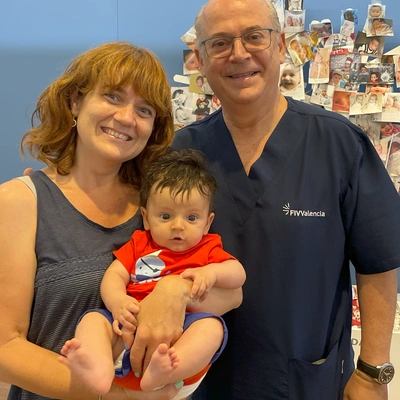Egg Freezing
5 years for just €75/month
Egg freezing is a proactive way to preserve your fertility, offering you the opportunity to delay pregnancy. As fertility declines with age, especially after 35, freezing eggs at a younger age allows you to have a baby later using your own eggs through In Vitro Fertilization (IVF).

What’s included?
At FIV Valencia, we’ve designed an affordable financing plan for women who wish to preserve their fertility. Our treatment includes:
- Initial consultation and fertility testing.
- Hormonal medication for ovarian stimulation.
- Egg retrieval procedure.
- Complete freezing process, including storage of your eggs for 5 years.
Learn more today!

Why Egg Freezing is Recommended
- Fertility begins to decline after age 30 and does so rapidly after age 35. Once past 35, it becomes increasingly difficult to conceive naturally.
- Freezing your eggs before age 35 enables you to preserve your fertility for when you decide to start a family.
- Vitrifying your eggs increases the likelihood of achieving pregnancy in the future without the need for donor eggs.




Key Benefits of Egg Freezing
Freezing your eggs offers you more control over your reproductive future.
Higher Quality Eggs
Egg Survival Rate
Maintaining Pregnancy Chances
Expert Guidance
Egg Freezing Costs

The price includes the initial consultation, fertility tests, hormonal medications for egg stimulation, the egg retrieval procedure, and the freezing process. At FIV Valencia, we’ve created an affordable financing plan for young women looking to preserve their fertility, which includes the maintenance of
frozen eggs. For detailed pricing, refer to our price list.
Who is Egg Freezing Suitable For?
We recommend egg freezing for the following cases:

- Women who wish to postpone motherhood for personal, professional, or other reasons - social freezing.
- Those preparing for cancer treatment that may affect fertility.
- Women who require ovarian removal due to medical reasons.
- In cases of a family history of early menopause.
- Trans individuals before undergoing hormone therapy or surgery that could impact fertility.
How Are Eggs Frozen?
Our team will support you every step of the way, ensuring you feel informed and comfortable throughout the process.
At FIV Valencia, the egg freezing process is simple and personalized according to each woman's unique needs. The steps include:
Discuss your fertility goals and understand the egg freezing process in detail.
Undergo a gynecological exam and blood tests to assess reproductive health and hormone levels.
Administer hormone injections for about 10–12 days to stimulate the ovaries. The medication is tailored to avoid discomfort or overstimulation.
Monitor progress through ultrasounds and schedule the egg retrieval procedure, typically two weeks after starting stimulation.
A minimally invasive procedure under general anesthesia. You will be discharged a few hours afterward.
Eggs are frozen using vitrification, a rapid freezing process, and stored securely in our lab until you are ready to use them.
Egg Freezing
FAQs
Who is it intended for?
Egg freezing is recommended for all women who need to delay motherhood but wish to preserve the option of having children with their own eggs in the future.
Is it recommended in cases of cancer?
Certain cancers (like breast cancer) and autoimmune diseases are often treated with chemotherapy, which can damage or destroy eggs. Vitrification is recommended before starting chemotherapy to allow future pregnancy with your own eggs.
Up to what age can I preserve fertility?
Fertility decreases rapidly after age 35, so it’s advisable to vitrify eggs before ages 35–38. This ensures you can use your own eggs in later years while maintaining their fertility.
How does fertility preservation work?
Vitrification involves freezing eggs at -196°C using cryoprotectants and rapid cooling, preserving almost all fertilization potential. Time doesn’t affect vitrified eggs—they remain viable for years.
Does hormonal stimulation cause cancer?
Fertility preservation treatments are short, like those for IVF, and do not cause tumours. Alternative techniques can be used if ovarian stimulation isn’t viable due to advanced hormone-sensitive tumours.
Does egg retrieval leave me sterile?
No. During each menstrual cycle, multiple eggs mature, but only one ovulates while the rest are lost. Stimulation helps mature these eggs for later use without affecting your ovarian reserve.
What is the success rate of egg freezing?
Success depends on your age and the number of eggs frozen. Women freezing eggs earlier have higher success rates. We offer a personalized evaluation to maximize your chances.
When should I discuss social freezing?
The best time is between ages 30–35. If outside this range, consult with your doctor to explore options and understand success probabilities.
What are the risks of egg freezing?
Risks are minimal. Your doctor will guide you through the process and address any concerns.
Is egg freezing worth the investment?
FIV Valencia offers a special financing program that includes egg freezing and five years of storage. The program is designed to be affordable and comprehensive.
What happens if I don’t use my eggs?
Unused eggs can be discarded, donated to scientific research, or given to other women facing infertility, per Spanish law 14/2006 on assisted human reproduction.
Does freezing eggs affect my ovarian reserve?
No. The eggs frozen are those your body would naturally discard, leaving your overall egg count unchanged.